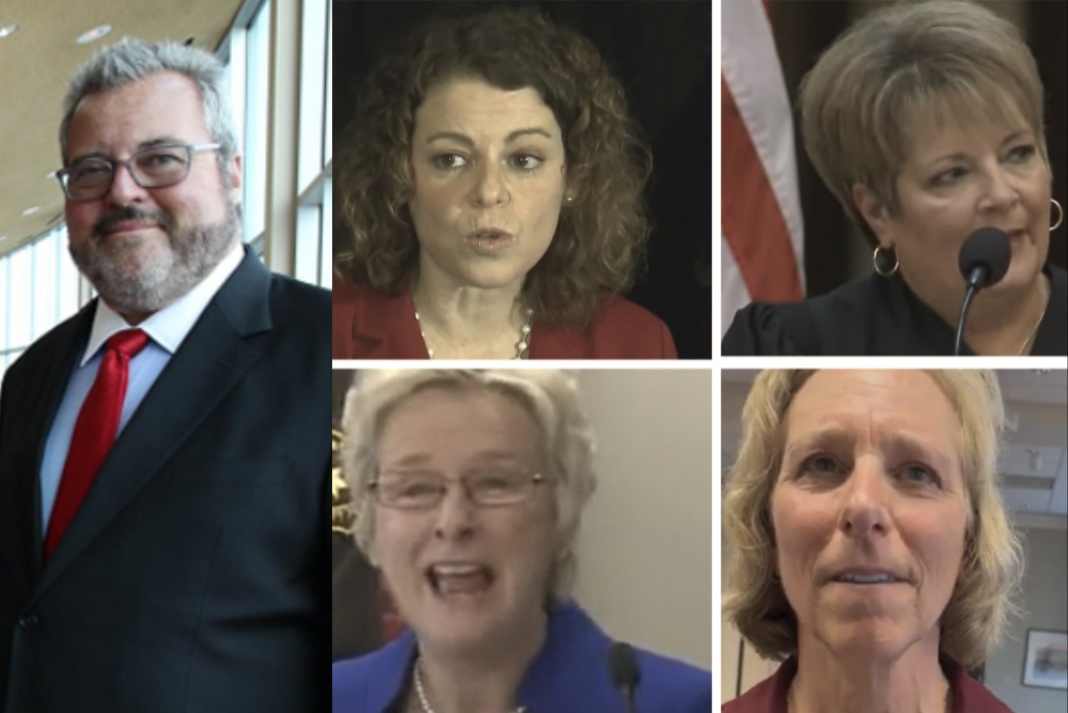Milwaukee “might have to go bankrupt” due to its financial mismanagement, Assembly Speaker Robin Vos said this week on the Wisconsin Right Now Uncensored podcast. Vos stressed that a Milwaukee bankruptcy should be a “last resort” that no one wants to see happen, but he also said that bankruptcy should not be taken off the table as an option.
Vos reiterated that the Assembly’s shared revenue plan gives Milwaukee two options to potentially avoid that scenario: 1, putting a new sales tax increase to a referendum to fund pension obligations (presuming voters passed it; Vos said Milwaukee leadership would have to make a strong case to the electorate) or 2, agreeing to a compromise that would allow the Common Council to raise the sales tax instead but only with a unanimous vote.
As for whether a referendum would pass, Vos said of Democrats in Milwaukee, “If they go out and sell it, there’s a chance. Are they going to have to admit 20 to 30 years of previous mayors’ mismanagement? You betcha they will.”
You can listen to Vos’s comments at the beginning of our podcast here:
Assembly Republican Leader Devin LeMahieu has been engaged in a public game of chicken with Vos over the referendum question. Lemahieu says the Senate version of the shared revenue plan won’t include the referendum requirement because he thinks it would fail, sending the city hurtling toward bankruptcy.
Both houses must agree to send a plan to Democratic Gov. Tony Evers. Evers has tweeted that he agrees with LeMahieu on the referendum question, even though he previously asked for exactly that.
“I think that would not fix the problems in Milwaukee. Because I think a referendum vote would fail,” said LeMahieu. “So I think the way to do it is through a vote by the common council and the county board.”
But Vos said for the first time that bankruptcy might not be a bad thing due to the city’s financial mismanagement, bringing up the experience of Detroit. In making the comments, Vos made it crystal clear how far he is willing to go, essentially taking the “but they might go bankrupt” card away from Democrats (and LeMahieu) and drawing a line in the sand on the referendum question. Asked how willing he is to bend on the referendum question on a 1-10 scale, with 10 being not willing to bend at all, the Assembly speaker said he is at a 9.9.
In 2019, the Detroit Free Press wrote of Detroit’s 2013 bankruptcy: “Now billions lighter in debt and running $100 million-plus annual surpluses, Detroit is in phenomenally better financial shape than when it entered the bankruptcy, which lasted 17 months.”
As for the referendum, Vos said, “we aren’t going to make it easy to raise taxes. That’s really what the ending sticking point is. They want to make it as easy to raise taxes as possible in Milwaukee and Milwaukee County, and it shouldn’t be like that.” He said that both the Metropolitan Milwaukee Association of Commerce (MMAC) and Evers have asked previously for a referendum on raising the Milwaukee sales tax. “It’s not a radical position,” said Vos. “If you’re going to create a brand new tax, the people should be the ones enacting it.”
He said he doesn’t “want the entire bill to die” but that he is “pretty steadfast to not make it easier for people who mismanaged their own finances to raise taxes. I feel like it’s a core Republican principle.”
He made the bankruptcy comments when asked what would happen if a referendum were voted down; what is the fallback option?
“I don’t want this to happen, but they might have to go bankrupt,” Vos said of Milwaukee. “I mean, that is not anywhere near the top of the list, but it is certainly something that has to be considered when you have financially mismanaged the city to the point that they have. The only option that might be left is bankruptcy. Again, that should be absolute last resort, but it shouldn’t be off the table.”
Vos said that, if people in the city don’t want to increase revenue to avoid a reduction of services, “the only other option might be bankruptcy.” He reiterated that Republicans in the Assembly also gave Milwaukee the option to increase the sales tax through a unanimous vote of the Common Council instead.
In the latter scenario, Vos said elected officials would “all have to own the decision.” He said Milwaukee is trying to “make up for the financial mismanagement of the past,” explaining again that the “only option that might be left is bankruptcy.”
Asked the ramifications of that, Vos said, “Look at what happened in Detroit.” He said a federal judge went in and made the city a receivership and “they changed how they did business and turned Detroit around. Some aspects of it might be positive.”
He added, though, that it was “too early to tell” and that bankruptcy “shouldn’t be on our radar.” He said officials have the ability “to get the referendum passed.”
Vos said that he and other Assembly Republicans started coming up with a new shared revenue plan last November because “inflation caused by over spending in Washington was having an incredibly negative impact on local governments.” The current version of the Assembly plan increases local government funding by a minimum of 15%.
He said Republicans have squeezed efficiencies out of local governments and held down property taxes for years, but inflation and big wage increases in the private sector were making it hard for local governments to generate enough revenue to stay competitive. He also said that the old shared revenue plan showed a major bias against small towns and rural areas, which the Assembly plan rectifies.
According to Vos, Assembly Republicans then came up with the plan (that was copied by Evers) to put 20 percent of the state sales tax into a segregated fund to increase shared revenue payments to local governments. He said Republicans negotiated with the City of Milwaukee and Milwaukee County to find “an updated way to do this.”
It is stunning that Senate Republicans will allow their "Leader" Devin LeMahieu and Tony Evers to kill the shared revenue plan because they think a referendum would fail. How dare any politician be expected to trust voters with decisions about their taxes? https://t.co/LmnJoR69rJ
— Jeff Wagner (@jeffwagner620) May 19, 2023
Vos said Assembly Republicans put a number of conservative elements into the plan, including restrictions “on who can close a business down” because current law has none; revising the Milwaukee Fire and Police Commission so the chief sets policy not the civilian commission (Milwaukee and Honolulu are the only cities set up the current way); and ensuring that the new money go to fund essential services like law enforcement, EMS, and for roads, not “new age mumbo jumbo.” The plan essentially ends defunding the police in Wisconsin, and it puts police officers back in Milwaukee schools.
Vos noted that some members of the Common Council previously “put money into the hop and have all these crazy things.”
He also pushed back at criticism from Waukesha County Executive Paul Farrow that his county doesn’t benefit enough, saying that “Waukesha County gets a 500 percent increase. Maybe Republicans in Waukesha County want a 1,000% increase.” But he said that the Waukesha County increase “is pretty reasonable.”
He noted that Republicans in the Assembly have to deal with the reality of a liberal governor. “This was the best deal we could cut,” he said. “We negotiated in good faith for months.” He said that Republicans made it clear the referendum question was a “core principle” to them from the beginning.
Asked if there is any chance he would negotiate that away, Vos did note, “If they’re willing to offer some core principles of theirs, that’s super important to us. You never say never.”
But he said the “idea of just giving it away and saying let a core principle of ours fall by the wayside is absolutely, positively unacceptable. It’s never going to happen.” Asked what he would be willing to horse trade for the referendum, he declined to say.
He said Republicans in the Assembly had “negotiated in good faith for months with the Senate” and that everything else in the bill they already agreed on. As for Evers, he said “his answer is always more money.”
“When you negotiate in good faith, one person can’t walk away and say change the deal and keep their honor,” said Vos.
Scene in Milwaukee County tonight: County Executive David Crowley, Mayor Cavalier Johnson and Speaker Robin Vos sit next to each other at the ceremonial swearing-in of Rep. Bob Donovan. pic.twitter.com/sZoQrGoqSA
— Jason Calvi (@JasonCalvi) January 9, 2023
He said that he wished Rebecca Kleefisch or Tim Michels were the governor. But he said they are not, so he had to sit down and try to find common ground with the left. He said that Milwaukee Mayor Cavalier Johnson and Milwaukee County Executive David Crowley insisted on having a specific formula to meet pension obligations, and Republicans gave them that. In return, the Democrats agreed to defund DEI and “focus on merit,” among other conservative principles, said Vos.
He believes that a “united Legislature” should negotiate with Evers. In the past, LeMahieu has not always done that, said Vos, which has made him “really angry” in the past. “We need to both stand there together,” he said, or it weakens Republicans’ negotiating strength.
“That’s the way this entire deal should be going,” said Vos.
“All three have to jump off together,” he noted.
“I don’t know why we are turning from that reality to say we all have to do this together,” Vos said of LeMahieu.
Vos stressed: “I do not want Milwaukee to fail.” He said “Milwaukee is our biggest economic driver” and he wants “them to solve their own problem.” He added, “It’s not a bailout” because the state isn’t just handing money over to Milwaukee to fix the pension mess. He noted that new city employees will be part of the Wisconsin Retirement System going forward.
According to Vos, the Assembly plan is a “conservative reform package. We are trying to find ways to win as conservatives in a very challenging environment with a liberal governor.”
Added Vos, “No one wants to see Milwaukee go bankrupt, That should be the absolute last resort.”
He said he hopes the Senate “takes a breath and do a little huffing and puffing” and then unite with the Assembly over the plan.
“It’s a really good deal for the citizens of Wisconsin.”






















